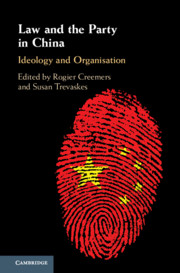1 - Ideology and Organisation in Chinese Law
Towards a New Paradigm for Legality
Published online by Cambridge University Press: 17 December 2020
Summary
This chapter examines the ideological spectrum within which law operates in China. It finds that ideology is not merely an external device that sits outside the law to justify or rationalise legal rules, actions and decisions. Rather, ideology is intrinsic to the logic of legal rules and the organisation of the state in China. Since it is the architectural scaffolding within which law operates, ideology permeates all aspects of the law in China. Given this relationship between law and ideology, the authors argue that it is necessary to study in greater depth the ‘top-level design’ that the Chinese Communist Party envisages using to reach its overall end-goal of ‘national rejuvenation’. In teasing out the conceptual components of this end-goal, including its historical antecedents, the logic by which the Party has made law into a pillar of this overarching political project becomes clear.
- Type
- Chapter
- Information
- Law and the Party in ChinaIdeology and Organisation, pp. 1 - 28Publisher: Cambridge University PressPrint publication year: 2021
References
- 3
- Cited by

